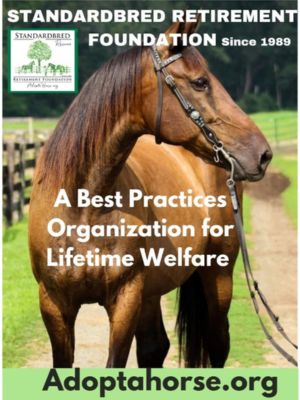BERKS AND MONROE COUNTIES, Pa--Following Governor Tom Wolf’s visits today to Kutztown and East Stroudsburg Universities, local Pennsylvania residents from Luzerne, Northampton, Wyoming, and Berks Counties spoke out in opposition to his plan to raid $204 million from a trust fund used for horse breeder incentives and racing purses to pay for his new college scholarship plan.
 The money in the fund, which is paid for out of casino slot machine revenues and are not taxpayer dollars, serves as the lifeblood of the state’s horse breeding and racing industry by funding purses and breeder incentives.
The money in the fund, which is paid for out of casino slot machine revenues and are not taxpayer dollars, serves as the lifeblood of the state’s horse breeding and racing industry by funding purses and breeder incentives.
The Governor’s proposal would force these individuals to close their farms and small businesses and possibly require them to move to another state.
They represent just a sampling of the more than 20,000 Pennsylvania residents who are employed as a result of the state’s horse breeding and racing industry, which provides a $1.6 billion economic impact and also preserves more than 100,000 acres of open space.
Under the Governor’s proposal, there would be no money left in the Race Horse Development Trust Fund for purses or breeder incentives.
“IF THIS PROPOSAL goes through and they take that money away, my whole farm is done for,” said Glenn Brok, owner of the 100-acre Diamond B Farm in Mohrsville, Berks County that is home to 150 horses. “Our entire business is built on thoroughbred breeding and we rely on the breeder incentives to keep our operation going. It’s not just my family and the families of my employees who will be impacted, but many local farmers and businesses as well. I spend about $250,000 per year to purchase hay and straw from local farmers such as Rohrbach Brothers and Roger Zweizig, so they and a dozen other small businesses I use are going to be hurt by this as well. We believed in Governor Wolf when he said this money would be there, when he signed legislation putting this money into a trust fund to prevent raids like this. Now he is turning his back on an entire industry.”
Brok said the damage and harm would extend far beyond his farm and other breeders.
He noted he buys a significant amount of supplies and feed from local small businesses such as Oley Valley Feed, Mountain View, and Reifsnyder Ag Center.
He said in the past 15 years, he has spent close to $1 million on new barns, sheds and other structures on his property that were built by Timberworks Builders and Precise Builders.
He also said it’s not unusual for him to have bills from his local excavator, who assists with ongoing maintenance on his farm, totaling about $25,000 per year.
Brok also noted he is a major customer for a local veterinarian, two blacksmiths, and horse transportation companies, and in addition, he pointed out the synergy the industry has with mushroom farmers like Guizetti Mushroom, who rely on horse breeders in Pennsylvania to supply and sell them manure, which they require to fertilize their crops.
Robert Baggitt owns a 132-acre horse farm in Bangor, Northampton County.
He is involved in harness racing and currently trains 15 Standardbred horses that race at the Downs at Mohegan Sun Pocono, located in Plans Township, just outside Wilkes Barre in Luzerne County. He and his wife also own ten horses of their own.
“If Governor Wolf has his way and depletes the Race Horse Development Trust Fund, the impact on my family - wife, daughter, son, and grandchildren - would be financially devastating,” said Baggitt. “Without the money in the fund for breeder incentives and purses, Standardbred horse racing will end in Pennsylvania. The impact will be felt by the local farmers that supply us with feed, hay, and straw. Our local tack shops would be affected as well. We’ve worked our whole lives to own our own 132-acre horse farm and now we might have to give it up because there will be no funds available or incentive to own it.”
Richelle Grieb owns and runs Daydream Farm in Hamburg, Berks County, a 74-acre farm that is home to 43 horses.
Her farm focuses largely on breeding thoroughbred horses.
“I have owned my farm for 20 years and breeding thoroughbred horses is my livelihood and I how I earn all of my income,” said Grieb. “This would shut me down. I would have no income. I would lose my farm. I would be homeless.”
Grieb also noted that it would impact other local businesses as well.
She said that on an annual basis she purchases about $25,000 worth of hay from one of her neighbors and roughly $10,000 worth of straw from another neighbor.
She also spends close to $50,000 each year purchasing feed for her horses from Albright’s Mill in Kempton, Albany Township in Berks County.
His thoughts were echoed by Erv Miller of Erv Miller Stable.
He and his employees train horses at a training center near Wind Gap, Northampton County for harness racing at the Downs at Mohegan Sun Pocono.
“My family and I just moved to a small town outside of the Allentown area, Wind Gap,” said Miller. “If the Governor were to take the money as he is proposing to do, we would not be able to stay in Pennsylvania. People in this area have just started to feel an economic upturn from the recently constructed training center here and if this proposal goes through, all of that would be lost.”
Ken Churchill and his business partner invested significant financial resources – more than $5 million within the past couple years -- to open Silver Springs Ranch, a Standardbred training center located in Harvey’s Lake, Pa., that straddles Wyoming and Luzerne Counties.
He felt betrayed that the Governor would seek to raid a fund that was converted into a trust in 2017 with the intent of encouraging new economic investment in Pennsylvania’s breeding, agriculture, and racing industries.
“We have invested more than $5 million into opening our new, state-of-the-art Standardbred training facility that sits on 78 majestic areas and began operations three years ago,” said Churchill, who is currently constructing a second 72-stall barn to accommodate boarding of Standardbred horses that race at Pocono Downs. “We are currently the largest economic development project in Wyoming County and are second only to Walmart with development permits. Taking away money from the horse racing industry would not only put me out of business, it would affect the economy of our entire area.”
Pete Peterson, spokesperson for the Pennsylvania Equine Coalition, said it is important to understand that the Governor is seeking to divert non-tax dollars from the Race Horse Development Fund. In 2017, the legislature passed – and Governor Wolf signed into law - legislation (Act 47) that specifically states the money in the RHDTF “are not funds of the Commonwealth” and that “the Commonwealth is not rightfully entitled” to the funds.
“Before gaming was expanded in the mid-2000s, track operators contributed to racing purses with a percentage of the money that was gambled on horse racing,” said Peterson “When the discussions were occurring about legalizing slot machines, everyone knew that adding a new form of competition for gambling dollars would result in less betting on horse races, so the track operators agreed to continue to supplement the racing purses, but with a portion of the revenue the tracks earned from slot machines. This also provided an added benefit, ensuring that the economic benefits of expanded gaming would not be limited to a 10 miles radius around casinos, but would be spread to rural communities throughout Pennsylvania that rely on our agricultural industry.”
“Yes, college tuition is spiraling out of control and college debt is a major concern,” said Peterson. “But you don’t fix one debt problem by creating another debt problem and putting 20,000 people out of work and bankrupting businesses and farms. If this is a priority for the Governor, he needs to find another source of funding, because his current plan would be a disaster for Pennsylvania agriculture, farms, and small businesses.”




































